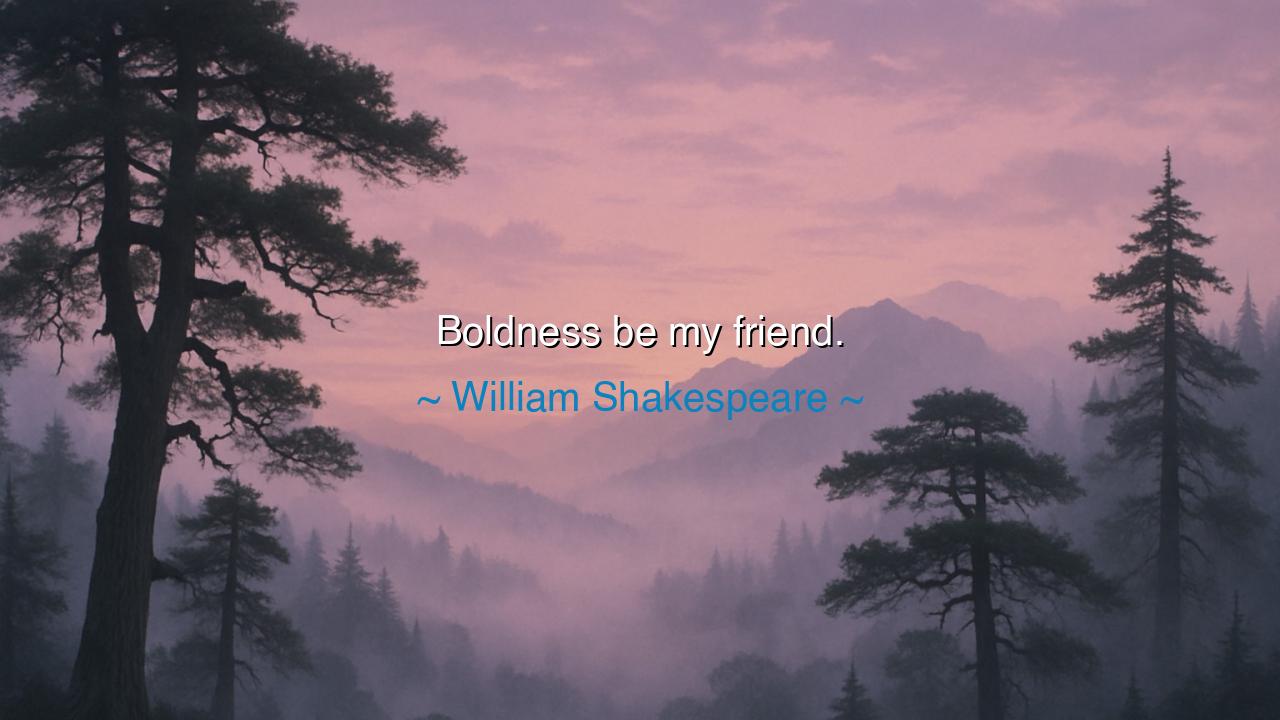
Boldness be my friend.






“Boldness be my friend.” These few words, penned by William Shakespeare in Cymbeline, carry within them the heartbeat of human courage. Though simple in form, they resound like a prayer — a plea not to the gods of fortune, but to the divine strength that dwells within the human spirit. To call upon boldness as a friend is to recognize it as both a companion and a guide, one that walks beside us when fear would turn our feet to stone. In Shakespeare’s time, as in ours, life was a stage of uncertainty, and those who achieved greatness did so not through comfort or caution, but through the daring flame of boldness.
In the play Cymbeline, these words are spoken by Imogen, a noblewoman faced with peril and loss. Betrayed, misunderstood, and cast adrift in a hostile world, she utters this invocation as she steps forward into danger. When she says, “Boldness be my friend,” she is not boasting — she is summoning courage, calling it forth from within her trembling heart. Shakespeare, ever the sage of the soul, understood that true bravery is not the absence of fear, but the act of walking forward despite it. In Imogen’s cry, he captures that moment known to every human being — when one must rise alone, with nothing left but faith in one’s own resolve.
In the ancient world, philosophers and heroes alike revered boldness as the first virtue of greatness. The Greeks called it tharsos — the divine confidence that allowed mortals to challenge fate itself. Alexander the Great, whose conquests reshaped the known world, was once asked by his generals what separated him from ordinary men. “Nothing,” he said, “except boldness.” He faced armies greater than his own, yet acted without hesitation, trusting in the strength that courage awakens. History remembers him not for caution, but for the audacity of his vision. Thus, from the stage of Shakespeare to the battlefields of antiquity, the same truth resounds: boldness is the fire by which human destiny is forged.
Yet Shakespeare’s wisdom is subtler still. To call boldness a “friend” is to see it not as a passing impulse, but as a constant companion. The timid soul calls upon courage only in crisis; the wise soul walks with it daily. To live boldly is not to be reckless — it is to meet life’s trials with openness, to speak truth when silence tempts, and to act when hesitation whispers. For it is hesitation, not failure, that kills the dreams of men. The bold will fall, yes — but they will rise again, while the fearful remain unmoved. Shakespeare teaches us that boldness is both a shield and a key: a shield against despair, and a key that opens doors once thought forever closed.
Think of Rosa Parks, who in 1955 refused to surrender her seat on a segregated bus. Her act was quiet, yet it shook the foundations of injustice. That day, she too could have whispered, “Boldness be my friend,” and in her calm defiance, the spirit of courage walked beside her. Her boldness inspired millions and changed the course of history — proof that true boldness need not roar. It can be steady, dignified, and unyielding, and yet alter the fate of nations.
To live without boldness, on the other hand, is to live half-alive. The ancients warned that timidity is a form of death — a slow fading of the soul. Boldness, they said, is the spark of creation, the power that moves mountains, builds kingdoms, and breathes art into being. Shakespeare’s prayer, then, is not only for Imogen, but for all who face the unknown: to invite boldness as a companion on life’s journey, to let it steady the hand and strengthen the heart.
Therefore, O seekers of wisdom, remember this: Boldness is not given — it is chosen. It begins as a whisper, then grows through action. Speak when your voice trembles. Step forward when your path is unclear. Declare your dreams aloud, even when the world doubts you. For boldness will not betray those who trust it. It will lift you when fear would drag you down, and carry you to heights unseen by the cautious. And when the day comes that you stand upon the threshold of great endeavor, remember Shakespeare’s immortal words — “Boldness be my friend” — and you shall find that it already is.






AAdministratorAdministrator
Welcome, honored guests. Please leave a comment, we will respond soon